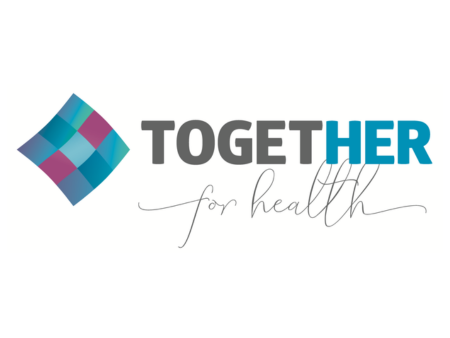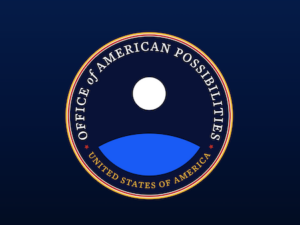TogetHER for Health advocates and supports reproductive health, particularly cervical cancer prevention.
Heather White of TogetHER for Health spoke with Lissa Harris on April 14, 2023. Click here to read the full conversation with insights highlighted.
Lissa Harris: Could you start by introducing yourself and your organization and just say a little bit about the problem that you’re working on solving?
Heather White: My name is Heather White. I am the executive director of a nonprofit called TogetHER for Health. We work in women’s health, reproductive health, but specifically in cervical cancer prevention. We are largely an advocacy organization, so we sit alongside a network of large and small nonprofits that are doing this work, but our role is to really amplify and echo what’s working, what are the challenges and what are the opportunities. And to unlock funding with institutional donors, with governments, and make the case that there are so many good problems to solve in our world, but this is one that we feel is particularly important and very solvable.
Lissa Harris: Who are the main beneficiaries of your work? Are they local organizations, health organizations? Who are you serving and how do they benefit from the work that you do?
Heather White: When we talk about our work, we really think about framing out in three different directions and we say that we scale up, we scale out and we scale deep. When we think about scaling up, it’s really policy drivers of structural change, and that means that the beneficiaries of our work are ultimately people who are doing the work and organizations and people where dollars would be beneficial to help their already good projects and programs and initiatives go further, faster, more efficiently. So, beneficiaries are considered the implementers, the doers.
The next part of our work is scaling out. That is trying to understand from folks that have done this work for many years, what works in women’s health, what works in reproductive health, what are the daily challenges that are needed to be solved to make women’s health closer to consumers, more high quality, better frontline providers, et cetera. That again is probably the doers.
The third part of our work we call scaling deep. In that sense, we’re really looking at how women’s lives are affected by this disease. Where does this issue fall on their very long priority lists of how to live their lives and be good mothers, be good sisters, aunties, professionals themselves? Really understanding what it is that keeps a woman from going into a clinic or taking care of this issue, and how families and communities are affected by cervical cancer and the larger, broader issues of women’s health and reproductive health. In that sense, our beneficiaries absolutely are the women, the patients, the survivors who are directly affected by the disease.
Lissa Harris: Can you talk about what makes your approach distinctive? How are you different from other people who were solving or tackling similar problems?
Heather White: The best way to exemplify that is through how we were founded. We’re a young organization, we’re about five years old, and we came into being because of a woman that I had been working with who was hoping to do the interview with me just now, and we decided it would probably not work well operationally. We were working on a project in India together that by all accounts was really effective. We were doing cervical cancer screening in district hospital settings in one of the largest states in India, Uttar Pradesh, and we caught the attention of the state government. They wanted to pick up and use that model in their district hospitals and build out that footprint. What felt like a great moment of achievement, my friend and the co-founder of this organization, a woman named Kathy Vizas, said, “You know what? This doesn’t feel like a win because there are so many other Uttar Pradeshs on the global map and there’s so much more work to do.” She felt like she was at the beginning of her story.
What makes us different is the fact that we are a very small organization, but we amplify the voices and the work of implementers in more than 30 countries. We come at it with the understanding of what needs to happen from an operational perspective, but we’re also looking from a structural and policy perspective. Having that dual focus of knowing the interventions but understanding that to really make change, we’ve got to strengthen the policy and unlock the funds that are really going to get us further down the line.
Lissa Harris: Can you point to an example that illustrates the impact of your work? Is there a particular story you like to tell?
Heather White: I can think of a few, but I’ll start with saying that in our area of work, the WHO published a global elimination strategy for cervical cancer in late 2020. Of course at the time there were other more urgent needs happening globally, essentially COVID, that really sort of hamstrung that call to action for global prevention of cervical cancer. We felt like as an organization, one of the things that we wanted to do was to keep people talking about the issue. We invested our own dollars in a small communications campaign that was largely driven by social media in Kenya called Kizazi Chetu, which means, Our Generation. What we were looking to do is create a whole society conversation about health and wellness generally, and cervical cancer and cervical health specifically. Over a six week period, we were able to reach 97 million individuals, we had 97 million impressions, through that campaign, so we knew that we were really onto something. We’ve continued to work in Kenya and we looked to broaden those kinds of campaigns in that country and throughout the region. So that’s an example of something that we feel like is a good showcase of our work in East Africa.
Lissa Harris: What insights, what teachable lessons do you think can be taken from your work that others might be able to use and build on?
Heather White: This is really a personal one that comes from a 20 year plus career in global public health, which is to say. Say yes to things because you never know when an opportunity may cross your path that may not initially feel like a good fit, or that you sort of scratch your head and think, “I don’t know.” But I would say if you have the bandwidth, and that’s a personal question for sure, but if you can, say yes. Because people are looking to connect and we’re not only about just the issue of health or even women, we can always ratchet up both our ability and our impact and our power if we can connect with one another. So when people bring opportunities or you are looking for partnerships and opportunities, say yes to people and see what happens.
Lissa Harris: How do you measure success? What’s the evidence that you’re making progress?
Heather White: For each of our three pillars, again, looking at policy changes, looking at operational efficiencies, and then looking at storytelling, we have metrics that sit alongside each of those from an interventional or a program perspective. Another metric for us is how many individuals or communities or organizations are we touching who are taking away our message? Part of being a new nonprofit in a relatively niche area is understanding the power of partnerships. We’ve had a lot of new partners and opportunities come our way, which is maybe why my advice to say yes to things. You start to see that ripple effect of individuals and organizations looking to work with you, so that is probably not a direct metric, but it’s certainly something that’s top of mind for me as we start to build out our communities and partnerships.
Lissa Harris: Sometimes you learn as much from things that don’t work as things that do. Is there something you can describe that you tried that didn’t work, that you learned something important from?
Heather White: When we first started out we knew that our role as advocates was going to be to listen, to understand and take away from the doers and the frontline providers. As part of that, we have a network of essentially 10 nonprofits working in 30 plus countries in women’s health, reproductive health and cervical cancer prevention, who we engage with regularly. This is not necessarily something that didn’t work for us, but it is something where we are learning how to evolve those relationships in such a way as to say, yes, you all are doing good work in cervical cancer prevention, but what are the other pieces of your work that we may not be touching but are still really impacting your ability to scale or to reach more women in general?
We are also a grant maker. We give small catalyst grants to organizations that are working in cervical cancer. We recently awarded a 1 year $30,000 grant to an institution that is working in Malawi. We heard from that group that they actually are going to have to turn down our funding because they were recently hit by Cyclone Fred. The communities have been devastated and the women that they were planning to work with are scrambling just to rebuild the basics of their lives. We had a conversation with my co-founder and myself to say, “We wanted to invest in them because we wanted to see them do good work in cervical cancer prevention, but maybe their needs are different now. So can we pivot in order to offer them a sort of structural rebuilding grant and make our money unrestricted so that it can help them get back on their feet and ultimately do the good work that they want to do in cervical cancer prevention?”
Maybe that’s not a lesson, but it is a challenge that we hadn’t come across before. It certainly speaks to health and climate change and the intersection of those two sectors. I would say that maybe the lesson or the insight there is to keep listening and be as flexible as you can, whether you’re a giver or a receiver. Keep being as agile and as honest about what you can and can’t do together and just try to keep moving forward.
Lissa Harris: And a lesson in priorities too. It’s hard to solve more granular problems when there’s a broad rupture in the community, work gets pushed aside. This might tie in nicely to the next question, which is that I was wondering if you could talk about challenges that you’re facing that you haven’t yet been able to overcome or solve? What are the kinds of big areas that are still really challenging for you?
Heather White: In our space, the organizations or programs or institutions that are funding this work tend to be global donors with very large reach and with significant funds. Although for every institution, big or small, finding additional dollars is always a challenge. But I would say looking at host country governments understanding the role of domestic financing in women’s health, reproductive health, and cervical cancer elimination continues to be a challenge. Because if I’m African Country X, I’ll take, I don’t know, Kenya as an example, and I’ve seen ODA dollars or PEPFAR dollars funding this work for many years, it’s easier to let myself off the hook as a domestic funder with many priorities and my laundry list of to-dos.
So I would say one of the challenges that we continually have is making the case not only with global funders, but also with national governments to say, “You’ve got beautiful policies on your books, but at some point those policies do have to be budgeted against, and the work has to start to cascade down to how that health system may be organized so that the doers can get access to those funds, build that capacity and put that work in motion or translate those beautiful policies and objectives into outcome and impact.”
Lissa Harris: You talked about scaling up and about policy change, can you talk more specifically about how you’re working to advance systems level change in your field?
Heather White: We’re a US-based institution so we have been working closely with our colleagues and others to push our government administration to continue to make investments and show leadership in cervical cancer. We’ve been working with legislative offices on Capitol Hill in Washington DC to make very specific requests to continue to fund this work through the PEPFAR mechanism and other US government mechanisms, and we’ll continue to do that.
Next week there’s a global scientific meeting on human papillomavirus in Washington DC. We’re going to take advantage of that work to bring experts and champions and patients and survivors onto Capitol Hill to tell their stories to say why this is an important issue and how we can all work together to change the tide of cervical cancer morbidity, mortality around the world.
Lissa Harris: This is an area too where things have changed pretty significantly because we now have some more preventive tools with the vaccines that have come out recently. I’m curious how much of that work is focused on prevention versus how much is intervention and treatment and whether that’s shifting?
Heather White: That’s a great question and I appreciate you highlighting that. For us, it’s really all about prevention. Not to say that women who need to follow on care, I mean, that’s got to get worked out. You need to understand what’s going to happen to a woman at each point in her health journey when it comes to screening and so forth. But we absolutely push on the prevention message because we know that this is the one cancer that people have figured out from start to finish and we can eliminate the number of cancers, ultimately eliminate the disease if we are smart and if we’re committed to HPV vaccination. Which you may know is now a single dose, they’ve been able to make the scientific case that originally it was three doses, then two doses, now a single dose of HPV vaccination can protect girls throughout their lifetime against the disease.
For women 30 and older, two screenings in a lifetime can substantially reduce her chances and likelihood of having cervical cancer so we often make the case that there are many good things to champion and to fight for in this world. This one is really a very small commitment on the part of individuals to knock off one less thing to worry about in their worlds. HPV vaccination, cervical screening, and of course following up anything that’s abnormal.
Lissa Harris: Has the political landscape around that work, I’m thinking specifically of the US but I’m sure you see that in other contexts too, changed significantly in the last few years because of the political dimensions of vaccines and that debate?
Heather White: I would say in some ways, and I’m painting with very broad brushstrokes here, so I can’t speak for every context of course, but I would say that we focus most of our time and attention on low, middle income country settings. In many of those settings the expanded programs on immunizations have really high coverage rates historically. We’ve certainly missed opportunities to vaccinate girls in many of those places because of the fallout from COVID, but we’ve not yet had tremendous fallout around vaccine hesitancy.
That’s juxtaposed of course with the US landscape, which is quite different. We have a small project working in Alabama on cervical cancer elimination, where I’m from, and that’s a bigger challenge, but not an insurmountable one. We’ve found unlikely partners and champions working with local school districts. We find that when you bring people honest, factual information and you’re able to have one-on-one conversations with people who understand what’s at stake, that you really can start to change what I think is very much a fear-driven reaction. Once you get buy-in from individuals that others in the community trust, then you’ve really got a chance to turn the tide.
Lissa Harris: What do you think is most needed from other actors or partners in this space to advance more systems level change?
Heather White: I would love to see, for any problem that’s as big as a sort of whole society problem like the elimination of a cancer, that it takes everybody. Not everybody has to eat, sleep, and breathe cervical cancer prevention the way that I do, but you can talk to people around you. Have you vaccinated your kids? Talk to your pediatrician, understand his or her point of view about the issue. You can do the most minute things that, if you start to add them up, really do have a ripple effect. At the end of the day, we’re all human beings. We all want to see our children prosper, we want to see our loved ones be supported, and ultimately we want people to live healthy, longer, prosperous lives. This is one case where if we all pitch in and make use of the tools and interventions that already exist, this is not about science creating bigger, better, et cetera, then we can wipe this cancer off the map. To me, that continues to be a really exciting promise and a really exciting proposition.
Lissa Harris: How do you see your work evolving over the next five years?
Heather White: I hope that we eventually do work ourselves out of a job. I would say, I don’t want to be here in 5, 10, I won’t even go beyond 10 years. We want to be able to make the case and to start to see the ripple effects of our works, of our efforts and other people’s efforts start to shore up those gaps where we start to see what feels like very fragmented programs and approaches start to be filled in so that you can see the ecosystem working.
So how do we evolve? I would say that in our first chapter, in the first five years, we work with the large INGOs, but I’m particularly compelled by and heartened by the work of small and mid-size NGOs. So I’d love to see us figure out how to not only talk to the big fish in the pond, but ratchet down and create meaningful conversations with the smaller players who are out there in the most remote settings, very challenged but doing amazing work. How do we support those guys?
Lissa Harris: We’ve covered a lot of ground here. Is there anything that we didn’t get to you that you think is important to add?
Heather White: This is the first time that I’ve been at the Skoll World Forum, and it is one of the few times that I can remember walking away from three days of heavy, intense conversations and feeling more positive, more inspired, lighter on my feet than when I started. That is a really impressive feat. I think that’s by virtue of not only the issues that people are taking up here, but just the positivity and the idea that we can do this. Whatever it is, whatever your big bet or your big problem is, we can do it. I would just say thanks to everyone who’s convened this forum to inspire all of us as change-makers.
Lissa Harris: Thank you so much for your time and for lending your voice to this project.
Click here to read the full conversation with insights highlighted.
Lissa Harris is a freelance reporter and science writer (MIT ’08) based in the Catskills of upstate New York. She currently writes about climate, energy, and environment issues from a local perspective for the Albany Times Union, her own Substack newsletter, and various other digital and print publications.
* This interview has been edited and condensed.
Learn about other social innovations in women’s health.







